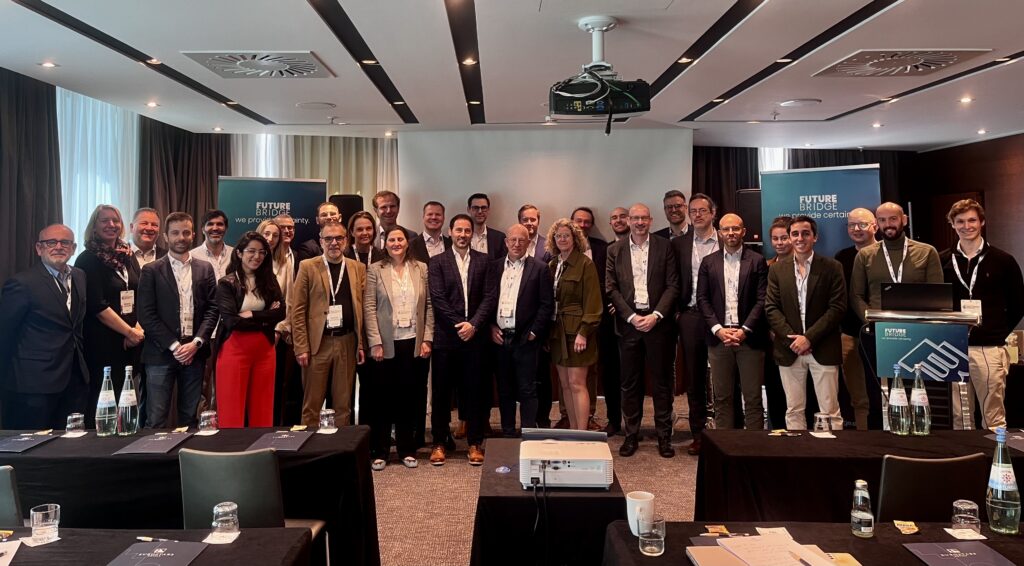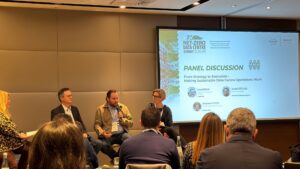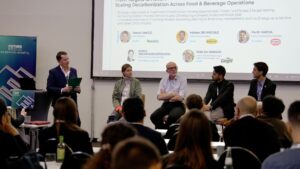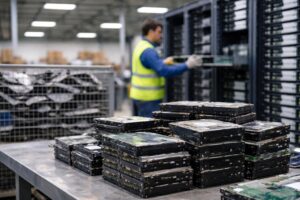The Net-Zero Energy Intensive Industries Summit in Berlin, Germany, on 6-7 May 2025, brought together leaders from energy-intensive sectors to voice their expertise on decarbonization challenges. The two-day conference featured sessions from expert speakers belonging to diversified industries, along with utility entities and electricity suppliers. Insights into strategies of sustainability, technology innovation, and implementing projects on decarbonization were provided to attendees. Moreover, the summit presented a platform for networking and business collaboration, with emphasis on practical solutions to attaining net-zero goals while remaining competitive in the industry. This article covers the most significant sessions during the summit and the sponsors that made this important industry conference possible.
Sessions at the Net-Zero Energy Intensive Industries Summit
The conference went in-depth to cover each facet of decarbonization and energy efficiency to make the attendees stand a step ahead of competitors. This section covers what each session was about, highlighting the key points raised by speakers:
Transforming Tomorrow Matters – Bondalti’s Sustainability Journey
Speaker: Susana CARVALHO, Head of Sustainability & Climate Transition, Bondalti
During this presentation, the speaker reinforced the prime position of the chemical industry in the economy and presented Bondalti’s sustainability philosophy. Furthermore, the session explained how a company can embed ESG values in all sectors internally and in the value chain. The speaker also stressed that ambition and performance are drivers for sustainable competitiveness. This showcased Bondalti’s position of balancing economic wealth and environmental protection.
Transform the historical “one-way” industrial thermal systems for processes requiring < 200°C
Speaker: Rossen IVANOV, Managing Director, Armstrong International EMEA
Rossen Ivanov shared new solutions to transform conventional industrial thermal systems. The speaker illustrated how it is possible to cut primary energy consumption by at least 50%. This is achieved by recovering industrial waste heat from processes and cooling systems for re-use. Moreover, the session introduced Armstrong’s Circular Thermal® solution based on Pinch analysis. It helps to create direct heat recovery opportunities and low-grade upgrading of heat. The presentation also covered integrating industrial high-temperature heat pumps (up to 120°C) for the generation of low-pressure steam.
Decarbonization in Focus: Overcoming CO₂ and Accounting Barriers in Energy-Intensive Sectors
Speaker: Teresa LORENZO, CO2 Strategy Manager, Heidelberg Materials
The session talked about the imperative issues of accounting and decreasing CO₂ in energy-intensive industries. Furthermore, the speaker shared insights from Heidelberg Materials’ decarbonization journey. This is with a focus on hands-on approaches to filling the implementation and accounting gaps. Additionally, the presentation at the Net-Zero Energy Intensive Industries Summit brought to life new solutions and methods. These allow energy-intensive industries to accurately track and efficiently reduce their carbon footprint without losing operational efficiency.
Sustainability Aligns with Current Business Realities
Speaker: Nancy GILLIS, Senior Director, Industrial Decarbonization & Centre for Decarbonization Demand Acceleration (CDDA), Scope 3 Peer Group / WBCSD
The session showed how business goals can be aligned with sustainability action in the face of rampant market volatility, regulatory lags, and supply chain disruptions. Furthermore, the presenter positioned sustainability as a risk management and resilience strategic approach. Moreover, the session reflected opportunities presented in emerging markets that come through operationalized sustainability. It also gave real-world examples of how businesses are successfully adapting to shifting regulations and political climates in sustainability plans.
Digital Infrastructure and AI: The Only Way to Survive the Energy Cost Crisis
Speaker: Robert HÄRTEL, VP of Business Development at neustrom
The session emphasized the necessity of digitalization in handling energy costs for capital-starved industries. The speaker referenced the hidden cost of inaction and mentioned that energy-intensive industries risk losing millions of dollars if they delay implementing digitalization. Furthermore, the speaker placed AI on the list of mandatory survival tools, which helps companies maximize the way they produce, use, store, and trade electricity. The presentation also touched on infrastructure and equipment to create smart, connected energy systems for optimal electrification.
Flat Steel Production with 360 Views in Sustainability Management: Water, Residue, and Emissions (CO2)
Speaker: Gilles MIROL, Chief Marketing Officer, Hydnum Steel
The speaker gave a session on Hydnum Steel’s strategy for environmentally friendly flat steel production. The session described the ambitious “3X100 & 3X zero” target model for the end-to-end management of sustainability. Moreover, he addressed the strategic reasoning for building a new flat steel plant in Spain, including some environmental aspects on which this move was based. The presentation was also deep in describing the application of partnership as a means towards achieving sustainability goals, introducing their project partner. It also described how that partnership adds value to their environmental activities.
Electrification of Industrial Heat: the Turboden way
Speaker: Rocco ALTIERI, Senior Sales and Business Development Engineer, Turboden
Rocco Altieri demonstrated Turboden’s pioneering solutions for electrically heating industrial heat processes. The presenter introduced their patented solution to address high-pressure requirements in energy-intensive applications. Additionally, the speaker explained their large Industrial Heat Pumps solution from the industry’s broadest portfolio of refrigerants. Turboden’s steam compressors for low-to-medium-pressure production, their cost-saving and compact design benefits for industry usage, were also displayed during the presentation.
PANEL DISCUSSION – Breaking Barriers to Net Zero: Overcoming Challenges and Unlocking Opportunities in Energy-Intensive Industries
Panelists:
- Christian HEIN, Head of Decarbonization, Aurubis
- Gilles MIROL, Chief Marketing Officer, Hydnum Steel
- Teresa LORENZO, CO2 Strategy Manager, Heidelberg Materials
- Nancy GILLIS, Senior Director, Industrial Decarbonization & Centre for Decarbonization Demand Acceleration (CDDA), Scope 3 Peer Group / WBCSD
This dynamic panel at the Net-Zero Energy Intensive Industries Summit facilitated open discussion of the key challenges and best practices to net zero in energy-intensive industries. Furthermore, the panelists presented insights from their industries—metals, chemicals, cement, pulp and paper, and glass. This made cross-cutting challenges and distinctive solutions clear. The discussion also elicited pragmatic solutions, policy considerations, and technological innovations. These net-zero strategies for energy intensive industries can overcome the challenges and unlock new potential for sustainable industrial manufacturing.

Integrating PPAs in a Company’s Power Portfolio
Speaker: Stefanie LECHLER, PPA Portfolio Development Manager, BASF
This session covered the integration of long-term PPAs into an existing power portfolio. The presenter discussed methods for matching PPAs with current power requirements and handling contract commitments efficiently. The presentation also covered the difficulties faced by companies in selling a PPA. It underlined risk management and portfolio realignment. So, through lessons learned and practical examples, the session offered useful insights on sustaining flexibility. This is while achieving long-term energy and sustainability objectives.
Energy Transition and Competitiveness in Electrointensive Industries
Speaker: Teresa MARQUES, Deputy Head of Integrated Production Planning & Energy, Bondalti
The session at the Net-Zero Energy Intensive Industries Summit covered the energy transition & competitiveness connection in energy-intensive sectors. The speaker explained approaches to managing risk and uncertainty in making the shift to cleaner forms of energy. Furthermore, the session defined the drivers influencing energy competitiveness for intensive consumers and evaluated their consequences for strategy. The session also went deep into the regulatory environment that governs energy markets. It additionally went through how companies can navigate these regulations alongside decarbonization goals.
Embed Sustainability in Everything We Do – Billerud’s Transition Towards Net-Zero
Speaker: Ingrid ENGSTRÖM, Sr. Director Industrial Decarbonisation, Billerud
The session presented Billerud’s end-to-end sustainability approach. The speaker emphasized that they start from sustainably governed forests as the starting point for their value chain. Further, the speaker emphasized that their products are based on renewable raw materials and are fully recyclable with excellent substitution effects through fossil-based product replacement. The presentation also accounted for their journey towards fossil-free operations and responded to their biggest challenge: reducing emissions in the value chain outside of their operations. Additionally, the speaker presented Billerud’s potential for capturing biogenic carbon dioxide and storing it underground. This lowers atmospheric carbon dioxide and increases climate impact mitigation.
Data is the new LED – How you can save energy with your data
Speaker: Sven SCHIFFNER, Research Associate, Fraunhofer IFF
Sven Schiffner defined data as an energy-efficient asset, such as LED light technology. The presenter emphasized that while the term “new gold” has been used in our era to define data, it is underutilized by most companies. Furthermore, the speaker went on to add that companies only monitor short-term data patterns whenever there are errors, whereas long-term observations, lasting years, very rarely take place. Additionally, the session demonstrated how top-level data analysis could be applied to draw attention to areas of concern and produce substantial energy efficiencies throughout industrial processes.
All the Way
Speakers: Mark ALLAN, Green Metals Group Leader, Materials Processing Institute; Dr. Hichem HAKKA, Group Leader – Energy and Process Decarbonisation, Materials Processing Institute
The speakers put forward the technical strategy of the Materials Processing Institute’s industrial decarbonisation. The session highlighted how impending low-emission processes and emerging technologies can overcome the last technological barrier in energy-consumption-heavy industries. Moreover, the speakers illustrated ways in which commercial manufacture can be delivered through targeted pilot-scale innovation hotspots. Additionally, real industrial examples from the Materials Processing Institute in the UK proved the successful implementation of decarbonising technologies, ready to scale up industry.
PANEL DISCUSSION – Technical Innovations and Practical Challenges in Decarbonizing Industrial Processes: What’s Next?
Panelists:
- Dr. Tatjana RUHL, Policypreneur – Leitung Dekarbonisierung der Industrie, Deutsche Unternehmensinitiative Energieeffizienz e.V. (DENEFF)
- Sven SCHIFFNER, Research Associate, Fraunhofer IFF
- Stefanie LECHLER, PPA Portfolio Development Manager, BASF
This forward-looking panel at the Net-Zero Energy Intensive Industries Summit covered cutting-edge technologies, practical applications, and technology hurdles that companies encounter in the context of decreased emissions. Moreover, presenters gave insight into pioneering strategies in decarbonizing policy, research, and industrial dimensions. Additionally, the discussion went through practical implementation challenges and solutions. This gave attendees an in-depth view of the future technological space for sustainable industrial processes.
Who Were The Sponsors For The Net-Zero Energy Intensive Industries Summit?
The Net-Zero Energy Intensive Industries Summit gathered key sponsors dedicated to driving decarbonization of heavy industry sectors. These companies contributed significantly towards promoting conversation, innovation, and cooperation towards net-zero ambitions. Therefore, let us have a look at them ahead:
Armstrong International – Silver Sponsor
Armstrong International was founded in 1900 and offers industrial thermal solutions with a focus on decarbonization. The company offers steam, condensate systems, hot water, humidification, control valves, and fluid measurement. Furthermore, its Circular Thermal method allows the recovery and upgrading of heat with at least a 50% reduction in primary energy usage while maintaining performance. Moreover, Armstrong has over 3,000 employees worldwide and emphasizes ethical values, family, and customer trust. At the Net-Zero Energy Intensive Industries Summit, Armstrong provided actionable thermal decarbonization strategies. It illustrated their extensive expertise and practical solutions to minimize energy usage without lowering operating efficiency. It assists industries in achieving emissions targets via reliable and proven technologies.
Turboden – Presenting Partner
Since 1980, Turboden has been the leading ORC (Organic Rankine Cycle) power generation and emission reduction specialist. Furthermore, their technologies complement renewables such as biomass, solar, geothermal, traditional fuels, and industrial waste heat. Turboden’s more extensive range encompasses gas expanders and megawatt-class heat pumps, all for industrial decarbonization. Moreover, driven by sustainability, innovation, and collaboration with customers, their mission is to fight global warming and fossil fuel use using carbon-neutral energy solutions. During the summit, Turboden presented in-depth information on electrifying industrial heat. Attendees got to know energy-efficient ways of lowering their carbon footprint. This is without compromising operating reliability using ORC and thermal management technologies.
Neustrom – Presenting Partner
Neustrom provides AI-driven electricity solutions that run continuously to coordinate, manage, and optimize generation plants, batteries, e-charging, and power purchasing. Furthermore, their solution combines AI, forecasting, and analytics to deliver flexible, affordable power management. Additionally, its main services are tailored power portfolios, microgrid installations, and strategic consulting. Its four-part approach—consultation, data analysis, strategy, and installation—is strong enough to capture up to 30% savings in the cost of electricity. It can also enhance the ROI and sustainability of assets. At the summit, Neustrom illustrated how digital tools enhance electricity use & trading for manufacturers. So, attendees got to learn how technological innovation provides resilience against volatility in the market and delivers smart and sustainable strategies for complex operations in the industry.
To Sum Up
The Net-Zero Energy Intensive Industries Summit offered a dynamic platform for learning and networking on the urgent issues of industrial decarbonization. Participants gained direct practical insights from industry experts across the energy-intensive sectors, from cutting-edge technologies to policy frameworks. The event showed that business competitiveness and sustainability can and should intersect as firms move toward a lower-carbon economy. For businesses committed to leading the emerging industrial revolution, attendance at such specialized sustainability conferences provides valuable learning from experts, access to creative solutions, and the partnerships required for effective decarbonization. So, look out for future summits and register right away!




